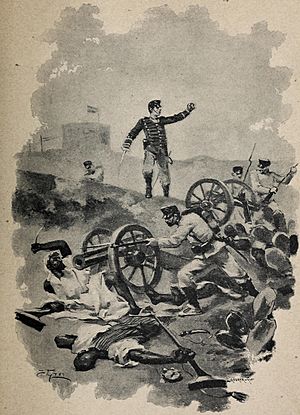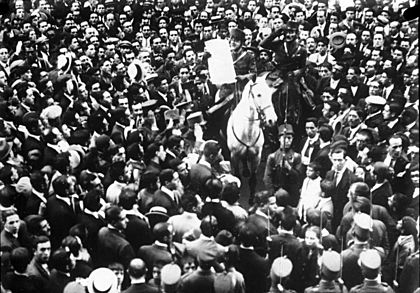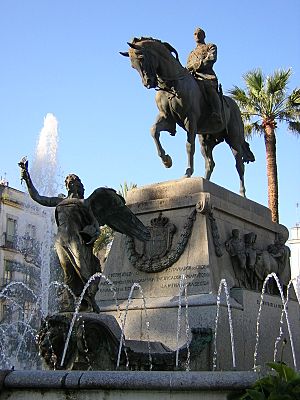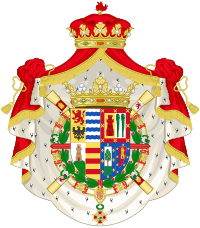Miguel Primo de Rivera facts for kids
Quick facts for kids
Miguel Primo de Rivera
OMC OTS
|
|
|---|---|
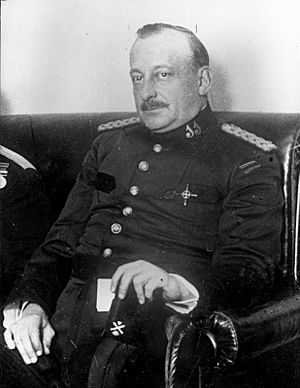
Primo de Rivera as a senator in 1921
|
|
| Prime Minister of Spain | |
| In office 15 September 1923 – 28 January 1930 |
|
| Monarch | Alfonso XIII |
| Preceded by | Manuel García Prieto |
| Succeeded by | Dámaso Berenguer |
| Personal details | |
| Born | 8 January 1870 Jerez, Kingdom of Spain |
| Died | 16 March 1930 (aged 60) Paris, French Third Republic |
| Resting place | Church of La Merced, Jerez |
| Political party | Unión Patriótica |
| Spouse | Casilda Sáenz Suárez |
| Children | José Antonio, Miguel, María, Pilar, Ángela, Fernando |
| Awards | Laureate Cross of Saint Ferdinand |
| Signature | |
| Military service | |
| Branch/service | Spanish Army |
| Years of service | 1884–1923 |
| Rank | Captain general |
| Battles/wars | Rif War |
Miguel Primo de Rivera y Orbaneja, 2nd Marquess of Estella (born January 8, 1870 – died March 16, 1930) was a powerful Spanish military leader. He became a dictator (a ruler with total power) and served as Prime Minister of Spain from 1923 to 1930. During his time, he believed that politicians were harming Spain. He thought he could fix the country by ruling without them. His main ideas were "Country, Religion, Monarchy."
Many historians see him as a leader who didn't have clear plans. He also upset some of his important supporters, like the army. He didn't build strong support among regular people. Instead, he relied on powerful groups. His actions weakened the king's power and hurt the monarchy. They also made social problems worse, which later led to the Spanish Civil War in 1936.
In 1921, he became the Marquess of Estella after his uncle passed away. With the help of King Alfonso XIII and the army, Primo de Rivera took control in a military takeover (called a coup) on September 13, 1923. The King then made him Prime Minister. He promised to get rid of corruption and make Spain strong again. To do this, he stopped the constitution, put the country under military rule, and controlled what people could say and write.
Primo de Rivera first said he would only rule for 90 days. However, he decided to stay in power longer. He didn't make many big social changes. But he tried to lower unemployment by spending money on public projects. To pay for these, he raised taxes on wealthy people. When they complained, he changed his plan and tried to get money through public loans. This caused prices to rise quickly. After losing the army's support, he had to resign in January 1930. His son, José Antonio Primo de Rivera, later became important in a political movement called fascism in Spain. During Primo de Rivera's rule, Francisco Franco became a general. He was the youngest person in Europe to reach such a high rank.
Contents
Early Life and Military Training
Miguel Primo de Rivera was born in Jerez de la Frontera. His family owned land and had many military members. His father was a retired colonel. His uncle, Fernando Primo de Rivera, was a top general in Madrid. He later helped bring back the king to Spain in 1875. This ended a difficult time called the First Spanish Republic. Miguel's great-grandfather, Bértrand Primo de Rivera, was also a general. He was a hero who fought against Napoleon Bonaparte.
Miguel first studied history and engineering. But then he decided to join the military. He got into the new General Academy in Toledo and finished his training in 1884.
A Career in the Army
His army career took him to colonial wars in Morocco, Cuba, and the Philippines. He held important military jobs in places like Valencia, Madrid, and Barcelona.
He showed bravery and leadership in battles against the Berbers in northern Morocco. He quickly earned promotions and awards. Primo de Rivera started to believe that Spain might not be able to keep its colony in North Africa. For many years, the government had tried to defeat the Berber rebels. This cost many lives and a lot of money. He thought Spain should leave Spanish Morocco if it couldn't control the area.
He had seen the humiliating defeat in the Spanish–American War in 1898. This war ended Spain's once-great empire. This loss made many Spaniards, including Primo de Rivera, very frustrated. They criticized the politicians and the government system. They felt it couldn't keep order, help the economy, or protect Spain's past glory.
Primo de Rivera went to Madrid to work in the Ministry of War with his uncle. In 1902, he married Casilda Sáenz de Heredia. They had a happy marriage and six children before she died in 1908. He was later sent on military missions to France, Switzerland, and Italy in 1909.
Between 1909 and 1923, Primo de Rivera's career grew. But he became more and more worried about Spain's future. He was hurt in battle in October 1911 in Morocco. He was promoted to brigadier general in 1911. He was the first person from the General Academy to get this promotion.
Spain faced many problems. In 1909, there was a brief social uprising in Barcelona. This happened after the army called up soldiers to fight in Morocco. Protesters burned churches and convents. Tensions grew as socialists and anarchists demanded big changes. The government couldn't fix itself or the country, and frustration grew.
After 1918, economic problems after World War I made social unrest worse. The Cortes (Spain's parliament) seemed to have no answers for unemployment, strikes, and poverty. In 1921, the Spanish army suffered a terrible defeat in Morocco at the Battle of Annual. This made the military's policies in North Africa look bad. By 1923, members of the Cortes wanted to investigate if King Alfonso XIII and the army were responsible for the disaster. There were many rumors of corruption in the army.
Becoming Spain's Leader
On September 13, 1923, the military, led by General Miguel Primo de Rivera in Barcelona, overthrew the government. Primo de Rivera then made himself dictator. He explained his takeover to the people, saying he wanted to fix Spain. King Alfonso tried to make Primo de Rivera's rule seem legal by naming him prime minister. Primo de Rivera said he wanted to "open a brief pause" in Spain's normal government. He believed the old politicians had ruined Spain and only cared about themselves, not the country.
Many people on the left side of politics didn't like the dictatorship. But some of the public supported Primo de Rivera. These Spaniards were tired of the chaos and economic problems. They hoped a strong leader, backed by the military, could put Spain back on track. Others were angry that the parliament had been pushed aside. Primo de Rivera traveled through Spain, giving emotional speeches. He showed he was a true Spanish patriot. He planned to keep the dictatorship long enough to clean up the mess made by politicians. He also wanted to use the government to modernize the economy and help working-class people.
Primo de Rivera started by creating a group of eight military men to lead, with himself as president. He then declared military law. He fired civilian politicians in the provinces and replaced them with military officers. When members of the Cortes complained to the king, Alfonso dismissed them. Primo de Rivera stopped the constitution and closed the parliament. He also tried to stop groups who wanted the Basque provinces and Catalonia to be independent from Spain.
Some thinkers, like José Ortega y Gasset, supported him at first. They believed he would end the old, corrupt politics. However, other thinkers, like Miguel de Unamuno, criticized his rule and were sent away from Spain.
What Primo de Rivera Did as Leader
The dictator had several successes early in his rule. The biggest one was in Morocco. This area had been a problem since the early 1900s. Primo de Rivera even talked about leaving the colony entirely. But when the Moroccans attacked the French area, France and Spain joined forces to stop the rebellion in 1925. Primo de Rivera went to Africa to help lead the troops himself. By 1927, the French and Spanish forces won. Spaniards were happy that the long and bloody conflict in North Africa was finally over.
Primo de Rivera also worked to build up Spain's infrastructure. This means things like roads, bridges, and power plants. Spain had few cars when he took power. By 1930, he aimed to expand this. The Barcelona Metro, which started many years earlier, opened in 1924. His economic planners built dams to create electricity from rivers. They also used the water for farming. For the first time, some rural areas of Spain got electricity. The government improved Spain's railroads, which helped the Spanish iron and steel industries. Between 1923 and 1927, foreign trade grew a lot. His government also protected Spanish businesses from foreign competition. This economic plan was mainly the idea of Primo de Rivera's finance minister, José Calvo Sotelo. Spain benefited from Europe's economic growth after World War I. However, most of this benefit went to the wealthy.
The peace in Spain was partly because the dictatorship tried to help Spanish workers. Primo de Rivera copied Benito Mussolini from Italy. He made businesses and workers cooperate by setting up 27 groups. These groups represented different industries and jobs. Within each group, government officials helped solve disagreements about pay, hours, and working conditions. This gave Spanish workers more influence than ever before. Individual workers also benefited because the government started huge public projects. The government paid for these projects with large public loans. Calvo Sotelo argued that these loans would be paid back by more taxes from a growing economy. Unemployment mostly disappeared.
But Primo de Rivera brought order to Spain at a cost: his rule was a dictatorship. He controlled the news. When thinkers criticized the government, he closed El Ateneo, a famous political and literary club. The anarchist group CNT was made illegal. Without the support of the Socialist Party, their strikes were violently stopped by the army. To stop people in Barcelona from wanting to separate, the government tried to remove Catalan culture. It was illegal to use Catalan in church or to dance the sardana. Also, many of the dictator's economic changes didn't truly help the poor. Huge government spending led to rising prices. The rich could handle this more easily. This created a big gap between the rich and working classes in Spain.
Primo de Rivera was a conservative leader, but his changes were big enough to worry the traditional powerful people. He didn't dare to fix Spain's biggest problem, which was land reform. This would have upset the large landowners.
Primo de Rivera mainly failed because he didn't create a strong political system to continue his changes. He seemed to truly want the dictatorship to be short. He hoped Spain could go back to its old constitution with new politicians. The problem was finding new civilian leaders to take over from the military.
In 1923, he started a new "non-political" party called the Patriotic Union (UP). It was officially formed the next year. Primo de Rivera claimed that UP members were above petty politics. He said they put the nation's interests first. He thought it would bring true democracy to Spain. But the UP was clearly a political party. It also failed to get much support or many members.
On December 3, 1925, he tried to bring back a more normal government. He dismissed the military leaders and replaced them with civilians. Still, the constitution remained suspended. Criticisms of his rule grew. By summer 1926, former politicians asked the king to remove Primo de Rivera and bring back constitutional government. To show his public support, Primo de Rivera ordered the UP to hold a vote in September. People could support his rule or not vote. About a third of those who could vote chose not to.
National Assembly and New Ideas
After his vote victory, Primo de Rivera decided to create a group to write a new constitution. On October 10, 1927, he opened a National Assembly. Even though they met in the parliament building, the members were chosen by Primo de Rivera. They could only advise him and had no power to make laws. In 1929, the assembly finally wrote a new constitution draft, following his guidance. One of its ideas was to give women the right to vote. Primo de Rivera believed women's political views were less likely to be extreme. He planned to have the country vote on the new constitution in 1930.
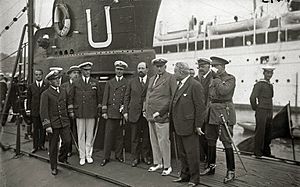
Why His Rule Ended
As the good economic times ended, Spaniards grew tired of the dictatorship. The value of Spain's money (the peseta) fell against other currencies. 1929 brought a bad harvest. Spain was buying much more from other countries than it was selling. Critics blamed the rising prices on the government's spending for public projects. Although no one knew it then, the end of the year brought the start of the Great Depression of the 1930s.
When Primo de Rivera lost the support of the king and the army, his dictatorship was doomed. The Spanish military had never fully supported his takeover, but they had allowed him to rule. However, when Primo de Rivera started to interfere with promotions in the artillery, it caused anger and opposition. The king also began to pull away. Alfonso had supported the creation of Madrid's University City. He watched with concern as students protested the dictatorship and the king's support for it.
The king didn't have to remove Primo de Rivera. On January 26, 1930, the dictator asked military leaders if he still had their support. Their weak responses, and his knowledge that the king no longer backed him, convinced him to resign two days later. Primo de Rivera moved to Paris. He died a month and a half later, on March 16, 1930, at age 60, from fever and diabetes.
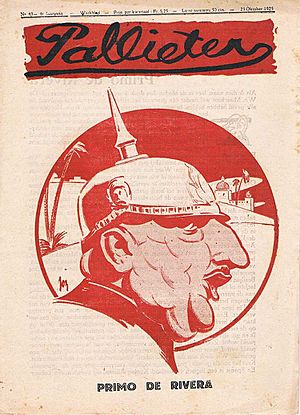
What Happened After He Left?
In the early 1930s, like much of the world, Spain fell into economic and political problems. Alfonso XIII appointed General Dámaso Berenguer, one of Primo de Rivera's opponents, to lead the government. This government quickly failed to bring back normal constitutional rule. Different leaders tried to make the king seem legitimate again, but he had lost trust by supporting the dictatorship.
Finally, local elections were held on April 12, 1931. While parties that supported the king won overall, parties that wanted a republic won in cities like Madrid and Barcelona. In April 1931, General José Sanjurjo told the King that he couldn't count on the army's loyalty. Alfonso XIII went into exile on April 14, 1931. He didn't officially give up his throne until 1941. This event started the Second Spanish Republic.
Two years later, Primo de Rivera's oldest son, José Antonio Primo de Rivera, started the Falange, a Spanish fascist party. Both José Antonio and his brother Fernando were arrested in March 1936. They were executed in prison by forces loyal to the Republic once the Spanish Civil War began in July 1936. The Nationalists, led by Francisco Franco, won the Civil War. They set up a much stricter government. By that time, many Spaniards looked back on Primo de Rivera's milder rule and its economic hope with more fondness.
Heraldry
- Heraldry of Miguel Primo de Rivera, 2nd Marquess of Estella
See also
 In Spanish: Miguel Primo de Rivera para niños
In Spanish: Miguel Primo de Rivera para niños


